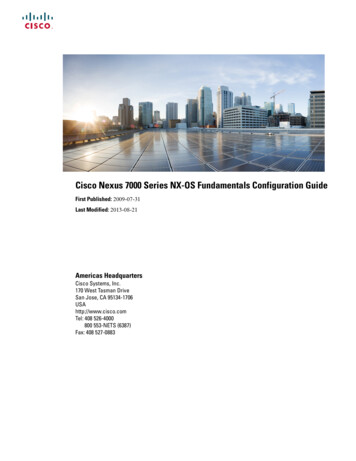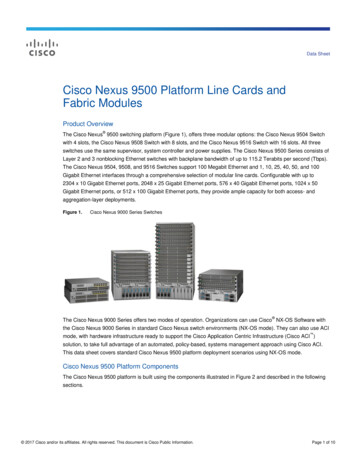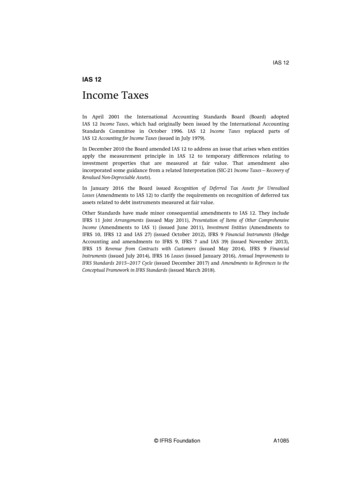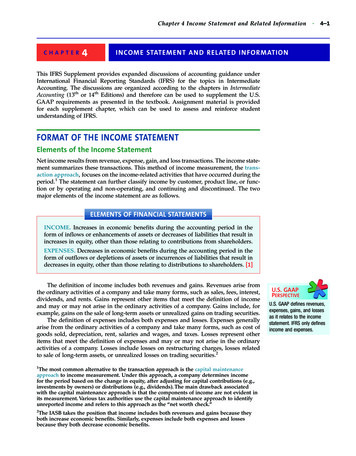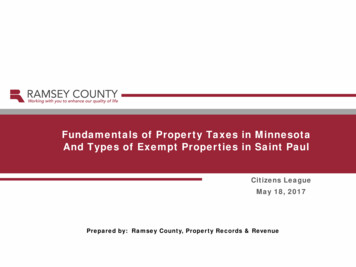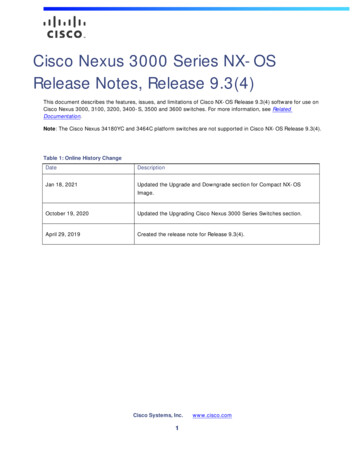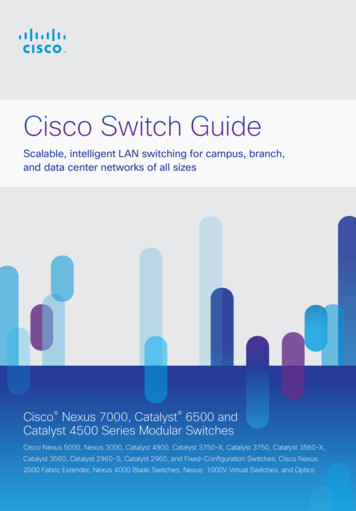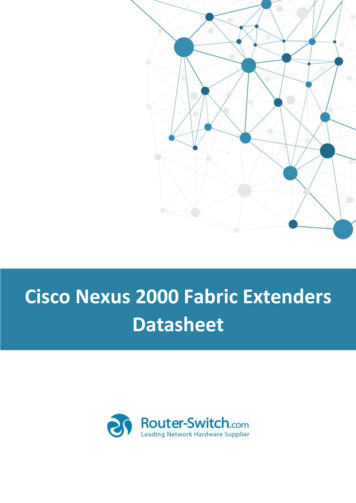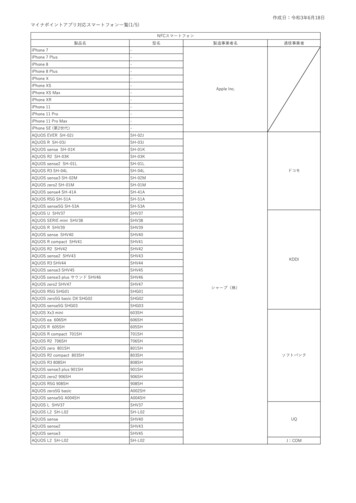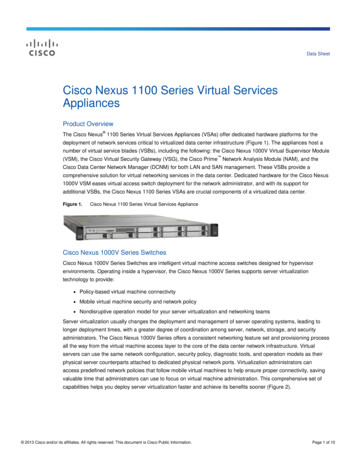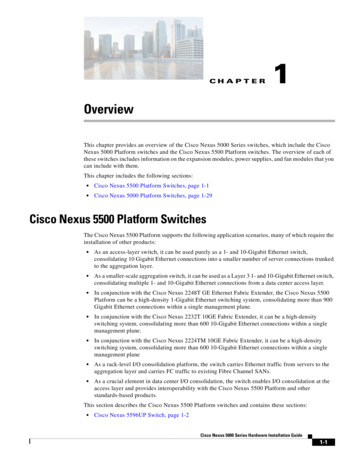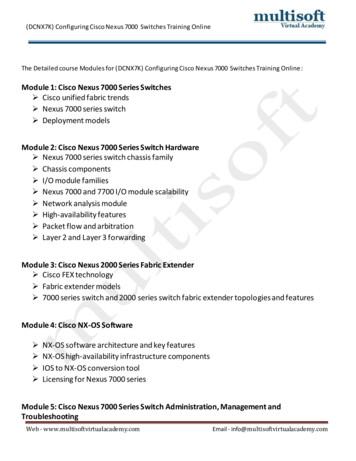
Transcription
Presenting a live 110‐minute teleconference with interactive Q&AEconomic Nexus and State Income Taxes:Responding to Latest DevelopmentsAvoiding Traps Triggered by Royalty Income, Support Activities, Excess Sales and Other Indirect PresenceTHURSDAY, DECEMBER 8, 20111pm Eastern 12pm Central 11am Mountain 10am PacificToday’s faculty features:Mike Shaikh,Shaikh Reed Smith,Smith Los AngelesEllen McCabe, Tax Principal, LarsonAllen, MinneapolisJaye Calhoun, Member, McGlinchey Stafford, New Orleans, La.For this program, attendees must listen to the audio over the telephone.Please refer to the instructions emailed to the registrant for the dial-in information.Attendees can still view the presentation slides online. If you have any questions, pleasecontact Customer Service at1-800-926-7926 ext. 10.
Conference MaterialsIf you have not printed the conference materials for this program, pleasecomplete the following steps: Click on the sign next to “Conference Materials” in the middle of the lefthand column on your screen.screen Click on the tab labeled “Handouts” that appears, and there you will see aPDF of the slides for today's program. Double click on the PDF and a separate page will open. Print the slides by clicking on the printer icon.
Continuing Education CreditsFOR LIVE EVENT ONLYAttendees must listen to the audio over the telephone. Attendees can still viewthe presentation slides online but there is no online audio for this program.Please refer to the instructions emailed to the registrant for additionalinformation. If you have any questions, please contact Customer Serviceat 11-800-926-7926800 926 7926 ext. 10.
Tips for Optimal QualitySSoundd QualityQ litFor this program, you must listen via the telephone by dialing 1-866-873-1442and entering your PIN when prompted. There will be no sound over the webco ect o .connection.If you dialed in and have any difficulties during the call, press *0 for assistance.You may also send us a chat or e-mail sound@straffordpub.com immediately sowe can address the problem.Viewing QualityTo maximize your screen, press the F11 key on your keyboard. To exit full screen,press the F11 key again.again
Economic Nexus and State IncomeTTaxes:RRespondingdi tot LLatestt tDevelopments SeminarDec. 8, 2011Mike Shaikh, Reed Smithmshaikh@reedsmith.comJaye Calhoun, McGlinchey Staffordjcalhoun@mcglinchey.comEllen McCabe, LarsonAllenemccabe@larsonallen.com
Today’s ProgramRecent Court Developments In This Area[Mike Shaikh]Slide 7 – Slide 15Recent Legislative And Regulatory Developments[Ellen McCabe]Slide 16 – Slide 25Responses For Corporate Tax Departments To Consider[Jaye Calhoun]Slide 26 – Slide 44DevelopmentspOn The Horizon[Mike Shaikh]Slide 45 – Slide 46
Mike Shaikh, Reed SmithRECENT COURTDEVELOPMENTS IN THISAREA
RRecentLiLitigationi i Of NoteNI. KFC (Iowa)II. W.L. Gore (Maryland)III L.L.III.LL BBean (Ohi(Ohio))IV. Telebright (New Jersey)V BIS (New Jersey)V.VI. Vestax (Michigan)VII. Whirlpool (New Jersey)8
KFC Corp.C KFC Corp. licenses KFC trademarks to franchisors in several states,including Iowa. No physical presence is required; economic presence is sufficient. Physical presence does not achieve a “bright line.” Licensing of intangibles into the state is held to an amount to thefunctional equivalent of physical presence under Quill. Also, sufficient nexus is based on the fact that the transactions thatproduced income were based on the use of intangibles in Iowa. U.S. Supreme Court denied certiorari.KFC Corp. v. Iowa Department of Revenue, 792 NW2d 308 (Iowa 2010),cert denied,cert.denied U.S.U S S.S Ct.Ct DktDkt. NoNo. 10-134010 1340, 10/3/20119
WL GW.L.GoreTwo intangible holding company (IHC) subsidiariesIHCs received royalties and interest from the operating entity.Tax Court held that the subsidiaries had sufficient nexus with Maryland,because the entities were engaged in a unitary business and the IHCs had noexistence separate and apart from the operating entity.IHCs depend on the operating entity for their existence and enjoyed functionalintegration and control through stock ownership. They also relied on theoperating company’s personnel, office space and corporate services,ddemonstratingi a llackk off separate corporate ididentities.iiCourt disregarded entities for nexus purposes but treated them as separatenon-filers for statute of limitations purposes. See also Nordstrom/Classics Chicago/SYL.W.L. Gore & Assoc., Inc. v. Comptroller of the Treasury, Maryland Tax Court, Nos.07-IN-OO-0084,, 07-IN-OO-0085,, 07-IN-OO-0086,, Nov. 9,, 201010
L L BeanL.L.BTest of commercial activity tax (CAT) bright-line nexus standard― Standard: More than 500,000 in annual taxable gross receipts in OhioTaxpayer sells apparel and other customer goods through Internet, telephoneand mail order.No physical presence in Ohio“The highest court in most, but not all, states that have considered the issue,including Ohio, has found that Quill applies only to sales and use taxes.”petitioner’s continuous, systematic,yand significantgsolicitation andAlso, “The pexploitation of the economic marketplace in Ohio is sufficient [for substantialnexus purposes].”― The taxpayer sends thousands of catalogs to Ohio and engages in otheradvertising, including print and television.― Gross receipts from Ohio sales of TPP exceeded 100 million. In Re: L.L. Bean, 2011 WL 2118350, Ohio Department of Taxation, No. 0000000198,Aug. 10, 201011
T l b i h CTelebrightCorp.One employee set up a home office in New Jersey, from which she wouldcheck in with the Maryland office via email from a personal laptop.She performed all work from her New Jersey home.Court held this created minimum presence required to tax the employer.― Taxpayer regularly and consistently permits the employee to workfrom her home in New Jersey. ― Corporation is “doing business at the place where its employees areexpectedt d tto reportt ffor work,k wherehththey are regularlyl l receivingi i anddcarrying out their assignments, where those employees aresupervised, where they begin and end their work day, and where theydeliver to their employer and customers a finished work product.”Minimum physical presence case Telebright Corp. v. Division of Taxation, 25 N.J. Tax 333, NJTC No. 0110662008 (March 24, 2010)12
BIS LP,LP Inc.ITaxpayer was a foreign corporation that has a 99% limited partnershipinterest in BISYS Information Solutions LP. ― BIS was an investment company.― BISYS was a banking information, data processing company. BISYS does business in New Jersey. Division claimed BIS and BISYS were unitary, and thus BIS was subjectto tax in New Jersey Court held there was no unitary relationship. No nexus in New JerseyBIS LP, Inc. v. Director, Division of Taxation, 25 N.J. Tax 88 (2009), aff’dNo A-172-09T2,No.A 172 09T2 2011 WL 3667622 (App(App. DivDiv. 2011)13
VVestaxSecuritiesSi i Corp.C Taxpayer is an out-of-state broker-dealer. Taxpayer had a contractual relationship with a network ofindependentdepe de t registeredeg ste ed representativesep ese tat ves ((IRRs),s), wwhichc wewereephysically present in Michigan. IRRs were used to facilitate securities transactions. IRRs were nott thIRRthe ttaxpayer’s’ agents,t andd ththere was nosubstantial nexus.Vestax Securities Corp. v. Dep’t of Treasury, No. 142535 (Mich.June 1, 2011), rev’g No. 292062 (Mich. Ct. App. Oct. 28, 2010)14
Whi lWhirlpooll New Jersey throw-out rule Sales are thrown out if a state lacks “jurisdiction to tax” theco po at o .corporation. New Jersey applies economic nexus principles; thus, there wasno throw-out of sales made in any other state. 86 272 issues86-272ipProperties,p, Inc. v. Director,, Division off Taxation,, 208 NJWhirlpool141 (2011).15
Ellen McCabe, LarsonAllenRECENT LEGISLATIVE ANDREGULATORYDEVELOPMENTS
California Economic Nexus StandardBeginning 1/1/11, a taxpayer is considered ”doing business” inCalifornia if any of the following conditions are satisfied: A. Taxpayer is actively engaging in any transaction in California forthe purpose of financial or pecuniary gain or profit.B. It is organized or commercially domiciled in California.C Its sales in California exceed the lesser of 500,000C. 500 000 or 25% of thetaxpayer’s total sales, orD. Its real property and tangible personal property in Californiaexceedd theth llesser off 50 50,000000 or 25% off ththe ttaxpayer's' ttotalt l reallproperty and tangible personal property.E. Its California payroll exceeds the lesser of 50,000 or 25% of thetotal compensation paid by the taxpayer.17
California Economic Nexus Standard (Cont.) PL 8686-272272 protection is still available, if applicable. Sales are assigned under R&TC Sect. 25135, R&TC 25136(b)and the regulations thereunder. Sales, property and payroll of the taxpayer include thetaxpayer’s pro rata or distributive share of a pass-throughentity’sy factors.18
Connecticut Economic Nexus Standard Beginning on or after 1/1/10, any corporation, partnership orS corporation deriving income from Connecticut sources orthat has substantial economic presence in the state, withoutregard to physical presence, will be liable for Connecticutincome taxes. Economic presence is evidenced by the purposeful direction ofbusness toward Connecticut, examined with regard to thefrequency, quantity and systematic nature of the company’seconomic contacts with the state.19
Connecticut Economic Nexus Standard (Cont.)A.20A bright-line test was established to determine if the frequency, quantityand systematic nature of the contacts result in nexus. Test consists ofthe following:1.If receipts from Connecticut sources are less than 500,000, then acompany will be deemed to not have nexus with the state.22.Income arriving from passive investment activity will not createeconomic nexus.3.Licensing of intangible property, if the licensor derives receipts inexcess of 500,000 under the license agreement with the licenseecorporation, will result in nexus. Transactions with related members(other than licensing activity) will not create nexus.4.provide pprotection to businesses thatPublic Law 86-272 will still phave economic nexus.
Connecticut House Bill 6652:Economic Nexus RevisionsA. Effective June 21, 2011 for years beginning on or afterJan. 1, 2011, a company must:1. Meet both, rather than one, of the existing criteria tohave economic nexus in Connecticut. “ derivesincome from sources within this state and that hassubstantial economic presence within this state”2. Economic nexus does not apply to a company that ist t d as a fforeigntreatedig corporationti underd ththe IInternaltlRevenue Code and has no income effectivelyconnected with the U.S. trade or business.21
Michigan Nexus Guidance:Corporate Income TaxA EffA.Effectiveti JJan. 11, 2012 MiMichiganhiBBusinessiTTax willill bbe replacedldbbya corporate income tax (on C corporations only). The corporateincome tax is imposed on taxpayers with business activity withinMichigan or that have an ownership interest or beneficialMichigan,interest in a flow-through entity that has business activity inMichigan. Public Law 86-272 protection can apply.1 “B1.“Businessiactivity”ti it ” means ththe ttransferf off llegalg l or equitableit bltitle to or rental of property, whether real, personal ormixed, tangible or intangible, or the performance ofservices or a combination thereof,services,thereof made or engaged inin, orcaused to be made or engaged in, whether in intrastate,interstate, or foreign commerce, with the object of gain,benefit, or advantage, whether direct or indirect, to thetaxpayer or to others.22
Michigan Nexus Guidance: CorporateIncome Tax – Bright‐Line TestAA.23Substantial nexus: A taxpayer has substantial nexus in Michigan and issubject to the corporate income tax if it:1.Has in-state physical presence more than 1 day during the tax year.22.Actively solicits sales in Michigan (meaning either 11. speech,speechconduct or activity that is purposefully directed at or intended toreach persons within Michigan and that explicitly or implicitlyinvites an order for a purchase or sale; or 2. speech, conduct oractivity purposefully directed at or intended to reach personswithin Michigan that neither explicitly nor implicitly invites anorder but is entirely ancillary to requests for purchase or sale order)33.H gross receiptsHasi t off 350 350,000000 or more sourcedd tto MiMichigan,hior4.Has an ownership or beneficial interest in a flow-through entity(either directly or indirectly through one or more other flowthrough entities) that has substantial nexus in Michigan
Business Activity Tax Nexus Bill (BATSA)A. Creates a physical presence requirement before a state couldassert jurisdiction and impose a tax on a businessB. Expands upon PL 8686-272272 by applying the solicitation exemptionto companies performing services and dealing in intangiblesC. There are a number of nexus “safe harbors,” such as anunlimited amount of employees and property in a state withoutcreating nexus, so long as neither is present in the state formore than 21 days within a particular year.D ProvidesD.Pro ides clarityclarit to companiesE. State administrators are opposed. The National GovernorsAssociation has estimated that the bill's enactment would lead tostate revenue losses of 4.7 billion to 8 billion annually.24
New Jersey: Expansion Of NexusOn Foreign CorporationsA NA.N.J.J Admin.Admin Code 18:7-118:7-1.8:8: Foreign corporations subjectto corporation business tax; expanded in 2011 to imposetax on any corporation that solicits business or derivesgross receipts from sources within the stateB. Financial business corporations, banking corporations,credit card companies or similar businesses that have theircommercial domicile in another state are subject to tax ifthey solicit business or receive gross receipts from sourceswithin the state.C. Retroactive application: For privilege periods beginning onor after Jan. 1, 2002D. See Technical Advisory Memorandum 6, issued 1-10-1125
Jaye Calhoun, McGlinchey StaffordRESPONSES FOR CORPORATETAX DEPARTMENTS TOCONSIDER
NNexusReviewsR i1. Nexus review – Be proactive - Don’t wait until you receive anexus survey, a letter from an auditor or a call from a remotestate’s tax department asking why you haven’t filed.2. Not your grandparents’ nexus standard – When can aseller/service provider/business operating over the Internetbe subject to a remote state’s business activity taxes or berequired to collect the remote state’s use taxes? Are DueProcess and Commerce Clause principles still relevant? Whatabout PL 86-272?3. Don’t let your guard down – Watch for new developments.27
Due Process Clause(F i(FairnessConcerns)C) No state “shall deprive any person of life, liberty or propertywithout due process of law.” Requires “some definite link, some minimum connection,between a state and the personperson, property or transaction itseeks to tax.” Quill Corp. v. N.D. (1992): Due process embodies “traditionalnotions of fair play and substantial justice.”28
Commerce Clause(S t i Concerns)(SystemicC) The Constitution was intended to address the problems that arose under theArticles of Confederation (1778) whereby each state was essentially a sovereignnation under the Treaty of Paris (1783).propensitypy of the states to erect pprotectionist trade barriers― Particularlyy the p― Created a national free-trade zone The Constitution gives Congress the power to “regulate Commerce among theseveral States.” Article 1, Section 8, Clause 3 Taxation is regulation.Complete Auto (1977): State taxes sustained if:― Applied to activity with substantial nexus― Fairly apportioned― Do not discriminate against interstate commerce― Fairly related to services provided by the stateQuill (1992): Requires at least some physical presence 29
Wh AreWhatA SStandards?d d ? Public Law 8686-272272― Brown-Forman Distillers Corp. v. Collector of Revenue(La. 1958, denied cert. 1959)― “Missionary men” who assisted with displays― Northwestern States Portland Cement Co.Co v.v Minnesota (1959)― Solicited orders, accepted outside state, leased office space in-state― Business lobbied Congress, arguing administrative burden was undue forinsignificant level of activity. Congress reacted quickly, passing a law intendedas a stop-gap measure and providing for a study known as the Willis Report.Report― Willis Report recommended quantitative rule, based on volume Complete Auto (1977): State taxes sustained if:― Applied to activity with substantial nexus― Fairly apportioned― Do not discriminate against interstate commerceprovided byy the state― Fairlyy related to services p30
Quill Corp. v. North Dakota,504 U.S.U S 2988 (1992)()― Commerce Clause requires a physical presence in the statebefore a state may impose a use-tax collectionresponsibility.― No such physical presence requirement applies,applies for DueProcess purposes― Principles applicable to taxes other than use tax?31
From Physical Presence ToMetaphysical Presence 32Scripto (1960): An agentagent, including an independent agentagent,may create taxable nexus in a state, even though theagent does not work fulltime and the company has nolocalized place of business in the state.St d d PressedStandardPd SteelSt l (1975):(1975) PPresence off an employeelcan create nexus.National Geographic Society (1977): Physical presenceg taxed;; ppresenceneed not relate to the transactions beingof advertising offices/staff created nexus for mail orderbusiness.Tyler Pipe (1987): Independent sales rep supplied requisitenexus by helping the manufacturer to establish andmaintain its market in the state.32
Royalty Companies Geoffrey, Inc. v. South Carolina Tax Comm, 437 S.E. 2d 13 (S.C. 1993),cert. denied, 510 U.S. 992 (1993)― The licensing of a trade name or trademark creates sufficient nexusbetween an out-of-state licenser and the state to meet both the“minimum connection” standard required by the Due Process Clauseand the “substantial nexus” requirement of the Commerce Clause. Lanco, Inc. v. Director, Division of Taxation― Corporation business tax applied to income derived by an out-of-stateintangible holding company from licensing fees attributable to NewJersey.― Follows Geoffrey rationale― Quill does not apply to income taxes.― U.S. Sup. Ct. Denied Cert. on June 18, 2007.33
Credit Card And Financial InstitutionsJJ. CC. PPenney NNationaltilBBankk v. JJohnson,hAAppeallNNo. M1998M1998-00497-COA-R300497 COA R3CV (Tenn. Ct. App. Dec. 17, 1999), appeal denied, Tenn. Sup. Ct. (May 8,2000) ― Tax did not violate the "minimumminimum contactscontacts" standard of the DueProcess Clause.― National Bellas Hess and Quill should apply.Tax Comm'r of W. Va. v. MBNA Am. Bank ― Out-of-state credit card bank has substantial nexus with West Virginiaeven though it does not have a physical presence in the state.state― Court adopts economic nexus standard.― Quill does not apply to income taxes.― U.S.U S Supreme Court Denied Cert.Cert on June 1818, 20072007.34
Credit Card And Financial Institutions (Cont.)MBNA America Bank, N.A. & Affiliates v. Indiana Dept. of Rev. (2008) ― Economic presence was sufficient to establish substantial nexusf an out-of-statefort f t t creditdit carddbbank.k QuillQ ill doesdnott extendt dbbeyonddsales and use taxes.― U.S. Supreme Court – cert. deniedCapital One Bank v. Commissioner of Revenue (MA 2009) ― Out-of-state intangible holding company/credit card bank havesubstantial nexus with MA, based on economic presence.― U.S. Supreme Court – cert. denied35
Economic Presence Nexus Standards:Factor Presence StandardAn out-of-stateAt f t t ttaxpayer doingd i bbusinessiiin a statet t willill hhavesubstantial nexus with the state and be subject to the state’sfranchise and income tax if any of the following thresholds areexceeded in the state during the tax period: ― 50,000 or 25% of the total property― 50,000 or 25% of the total payroll― 500,000 or 25% of the total salesOhio (as part of the CAT) and California (effective Jan. 1,2011) have adopted a “factor presence nexus standard.” 36
What Are Limitations OfEEconomici PPresence NNexus? Sell in home state to a customer in Ohio or Michigan Customer comes into store to buy product and returns to home state Customer comes into store to buy product, and store arranges delivery tocustomer in neighboring state Customer calls and orders product Advertising― Local newspaper with Internet site― National newspaper― Send flyers into a specific state― Send flyers in a nationwide mailing― Radio advertisement― AdvertiseAd ti on a localll televisiont l i i stationt ti― Nationwide television ad― Does the type of advertising matter? Goodwill vs. product solicitation If you have advertising nexus, must the company refuse to sell to customersfrom economic presence states to avoid filing responsibility?37
What Are Limitations Of EconomicPPresenceNNexus? (Cont.)(C) Call center in home state engages in nationwide solicitation 86-272 protected solicitation? Web page invites customers to sellers location in neighboring state Web page invites customers to call to place order Web page allows for online orders Web page provides access to database for a fee― Does it matter if you know location of customer?― Mail out product vs. downloaded product paid via PayPal E-maill salesl solicitationlto purchasedh d e-maill addressddllist, on whichh haddresses are not state-specific Do Internet sellers have to screen customers for home state locationto determinedi whetherh h to sellll to them,hto avoidid filifiling responsibility?ibili ?38
Are There Limits To Economic Nexus? 39New Jersey economic nexus case Quark, Inc. v. Director, Div. of Taxation, N.J. Tax Court DocketNo. 005744-2003 (Aug. 13, 2009) New Jersey’sJersey s Taxation Department assessed its corporateincome tax on two software companies, citing Lanco (188 N.J.380) as its authority. Both software companies had very modest sales in the state( d th(underthe MTC’MTC’s 500 500,000000 salesl ththreshold).h ld) N.J. Tax Court rejected the Taxation Department’s argument,finding this case is different than Lanco (intangible propertyvs. tangiblegcopyrightedpy gpproperty).p y) No affiliation with an entity that had a physical presence inNew Jersey; this was an operating entity, not a holdingcompany created to generate a tax benefit.
P di IIssuesPending How do the states react to the denial of certiorari by theSupreme Court in nexus cases? Will states become more creative in expanding whatconstitutes substantial nexus? Will states expand use of economic nexus to foreigncommerce?40
V lVoluntaryDi lDisclosureAgreementsAOffers:1. Limitation of exposure – Some states will agree to limit exposure tocurrent and future years, and some may agree to limit prior yearexposure to several years. There is generally no statute of limitationsfor non-filed returns.2. Penalty (and sometimes full or partial interest) waiver – Penaltywaiver is typical, but interest may also be eliminated or reduced.3. Increased opportunity to manage audit activity – Returns may ormay not be audited when filed. But, a voluntarily filed return is akinto a self-audit, and taxpayers generally do better on self-audit.4. May also avoid possibility of prosecution41
Voluntary Disclosure Agreements (Cont.)Requirements:1. No previous contact by state – Voluntary disclosure proposalsare not considered voluntary if the state already has thetaxpayer on its radar. Have returns ready to go in order tomaintain the option when it is likely that the state willdiscover the nonnon-filingfiling business.business2. Made anonymously – Requires using a third-party professional(attorney/accountant) to approach the state3. If accepted – The taxpayer must usually file the returns, paythe tax and any interest within a brief period of time fromacceptance.42
AAmnestyPProgram ParticipationP i ii1. Very popular with states in hard economic times - The California FranchiseTax Board’s most recent tax amnesty program brought in 350 million. In2004, California ran a “voluntary compliance initiative” that brought in 1.3billion. A prior, more widely available program in 2005 brought in 3.2 billion.2.Usually carrot-and-stick Approach – Post-amnesty penalties can besignificant, and lookback periods are not limited for those taxpayers thateither didndidn’tt participate or simply were not aware of the programprogram. This isparticularly troubling in states where economic nexus standards are beginningto take hold.3.qmust be met – Failure to meet the strict requirementsqofStrict requirementsa state’s program could result in the untenable situation in which a taxpayerhas made complete disclosure without gaining amnesty protections andbenefits.44.M tbMustbe compliantli t goingi fforwardd43
AApportionmentiSStrategies/Issuesi /I1. Single-sales-factor states – Economic nexus theoriescombined with single-sales-factor states create issues for nonresidents.2. Consider seeking the right to apportion within states inwhich the business already has a physical presence3. Sales of services and intangibles – Market-sourcing statescreate opportunities/problems.4. Property and payroll44
Mike Shaikh, Reed SmithDEVELOPMENTS ON THEHORIZON
DDevelopmentslO ThOnThe HHorizoniU S Business Activity Tax Simplification Act (BATSA),U.S.(BATSA) HR 1439 46 Physical presence standard for all business activity taxes Applies P.L. 86-272 to all sellers, including sellers of intangibleproperty Includes more qualitative de minimis activities beyondsolicitation Defines physical presence (14-day rule) Recent developments House Judiciary Committee approved legislation on July 7,2011. Now on House of Representatives floor Similar legislation is expected in the Senate.
―BISYS was a banking information, data processing company. BISYS does business in New Jersey. Division claimed BIS and BISYS were unitary, and thus BIS was subject to tax in New Jersey Court held there was no unitary relationship. No nexus in New Jersey BIS LP, Inc. v. Director, Division of Taxation, 25 N.J. Tax 88 (2009), aff'd
